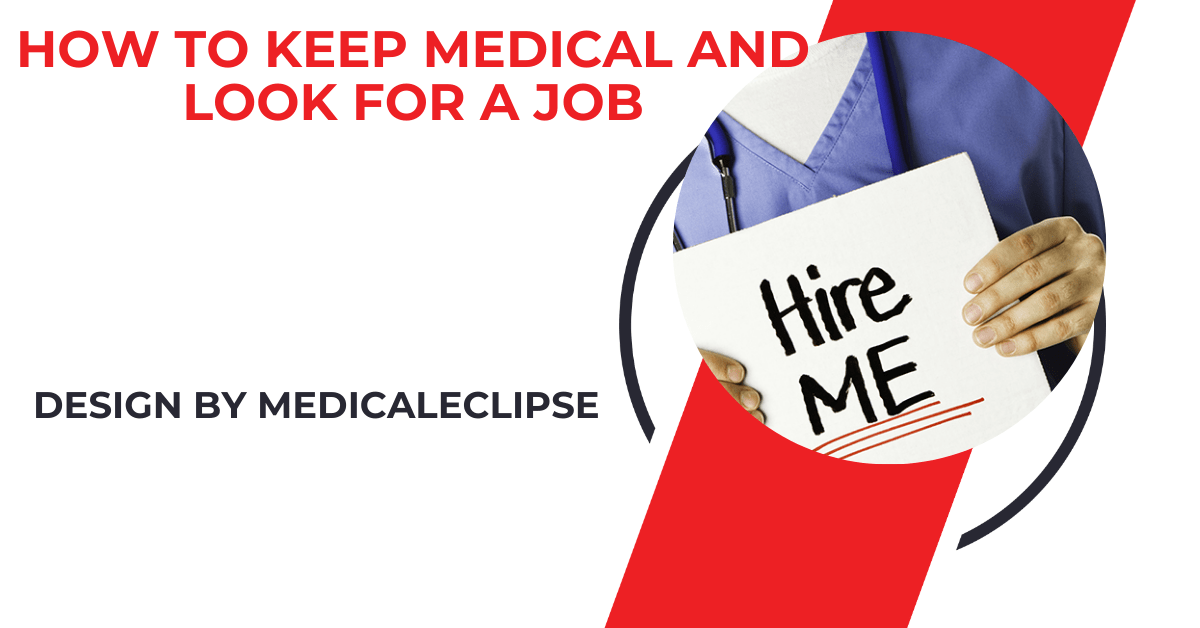To maintain your medical career while job hunting, clearly define your career goals, keep your skills current, and actively network with professionals in your field.
Here’s a comprehensive guide to help you manage both aspects effectively.
How to Keep Your Medical Career on Track While Job Hunting:

Navigating the job market in the medical field can be a daunting yet rewarding endeavor. Whether you’re a recent graduate, a seasoned professional, or transitioning to a new role, keeping your medical career on track while actively looking for a job is essential. The healthcare sector is ever-evolving, and it’s vital to remain current with developments and maintain professional momentum.
Understand Your Career Goals:
Before beginning your job search, it’s important to define your career goals. Understanding your aspirations will help you target your efforts effectively. Here are a few steps to keep in mind:
Self-Evaluation:
Perform a comprehensive self-assessment to recognize your strengths, weaknesses, interests, and values. This can be achieved through:
- Personality Assessments: Tools like the Myers-Briggs Type Indicator (MBTI) or the Holland Code (RIASEC) can provide insights into your career preferences and help you understand which medical roles may be a good fit.
- Skill Inventory: List your clinical skills, soft skills (like communication and teamwork), and any specialized training or certifications you possess. Identify which skills you enjoy using and which you may need to develop further.
Short-term vs. Long-term Goals:
Differentiate between your immediate job search needs and your long-term career aspirations. Consider:
- Immediate Goals: Perhaps you’re seeking a position to gain experience or stabilize your finances. Focus on roles that provide valuable skills or connections.
- Long-term Goals: Visualize where you see yourself in five to ten years. Do you aspire to be a specialist, take on administrative roles, or engage in research? Understanding your trajectory can help you choose job opportunities that align with these goals.
Specialization Decisions:
Consider whether you want to continue in your current specialization or pivot to a new area of medicine. Here’s how to approach this:
- Research Emerging Fields: The medical field is constantly evolving. Areas like telemedicine, genetic counseling, and integrative medicine are gaining traction. Explore these fields and evaluate if they resonate with your interests and skills.
- Informational Interviews: Reach out to professionals in areas you’re considering. Conducting informational interviews can provide valuable insights into the day-to-day realities of those roles, helping you make informed decisions about your future.
Maintain Your Medical Skills:

Staying sharp in your medical skills is crucial, especially if you’re taking a break from clinical practice. Here are several effective methods to keep your skills up to date:
- Regional and National Conferences: Events like the American College of Physicians (ACP) Internal Medicine Meeting or the American Academy of Family Physicians (AAFP) Family Medicine Experience (FMX) offer sessions on the latest research, technologies, and best practices.
- Specialized Workshops: Look for workshops that focus on specific skills, such as advanced cardiac life support (ACLS) or suturing techniques. These hands-on experiences can help refresh and refine your skills.
Online Courses and Certifications:
Platforms like Coursera, Medscape, and Khan Academy offer a variety of courses on medical topics. Consider:
- Accredited Certifications: Pursue certifications that are recognized in your field. For example, obtaining a certification in Basic Life Support (BLS) or Pediatric Advanced Life Support (PALS) can enhance your resume and increase employability.
- Continuing Medical Education (CME): Many states require a certain number of CME credits for license renewal. Seek out accredited programs that align with your interests and specialties.
Participate in Professional Development Programs:
Many hospitals and medical associations offer programs to help healthcare professionals enhance their skills. Consider:
- Internships and Fellowships: Even if you’ve already completed your residency, look for internships or fellowship opportunities that allow you to gain experience in a new specialty or practice area.
- Mentorship Programs: Join a mentorship program where you can connect with experienced professionals in your field. Mentors can provide guidance, support, and insight into career advancement.
Also Read: The Importance of Addressing Depression Early for Effective Treatment
Stay Informed:
Regularly read medical journals, articles, and research studies in your field. Here’s how to stay informed:
- Subscribe to Journals: Journals like The New England Journal of Medicine or JAMA offer cutting-edge research that can enhance your understanding of current practices.
- Follow Medical Blogs and Podcasts: Many professionals share valuable insights through blogs and podcasts. Find reputable sources that focus on topics relevant to your interests.
Build a Strong Network:

Networking is one of the most effective ways to learn about job opportunities in the medical field. Here’s how to build and maintain your professional network:
Join Professional Organizations:
Organizations such as the American Medical Association (AMA) or specialty-specific associations provide resources, mentorship, and networking opportunities. Consider:
- Membership Benefits: Many organizations offer job boards, educational resources, and opportunities to attend conferences. Take full advantage of these benefits to grow your knowledge and connections.
- Active Participation: Attend local chapter meetings, volunteer for committees, or present at conferences. Active participation can significantly enhance your visibility and credibility within your field.
Connect on LinkedIn:
Use LinkedIn not just to connect with colleagues, but to engage with thought leaders in your field. Here’s how:
- Optimize Your Profile: Ensure your LinkedIn profile is complete, with a professional photo, detailed work history, and a summary that highlights your skills and goals.
- Engage with Content: Share relevant articles, comment on posts from industry leaders, and participate in discussions to increase your visibility and credibility.
Attend Networking Events:
Look for local networking events or webinars focused on the medical field. Here are a few tips:
- Local Meetups: Utilize platforms like Meetup.com to find local health-related meetups, conferences, or workshops in your area.
- Networking Dinners or Lunches: Attend informal networking events where you can connect with fellow professionals over a meal. Building personal connections can lead to valuable job referrals.
Leverage Alumni Networks:
Reach out to your alumni network for connections in your field. Many alumni associations have job boards or mentorship programs that can provide valuable resources during your job search:
- Reconnect with Classmates: Reach out to former classmates to see what they’re doing and explore any job leads they may have.
- Participate in Alumni Events: Attend events organized by your alma mater, as they can be excellent opportunities to connect with fellow graduates and industry professionals.
Also Read: Why Newport Beach Plastic Surgeons Are Popular for Aesthetic Procedures
Create an Impressive Resume and Cover Letter:
Your resume and cover letter are your first chances to make an impression on potential employers. Here are some tips to make them stand out:
Tailor Each Application:
Customize your resume and cover letter for each job application. This personalization reflects your sincere enthusiasm for the role. Consider:
- Use Specific Keywords: Review job descriptions to identify key skills and qualifications. Incorporate relevant keywords into your application to ensure it aligns with what the employer is seeking.
- Match Your Experience: Highlight experiences and accomplishments that are particularly relevant to the job. If a job emphasizes teamwork, include examples of successful collaborations you’ve been part of.
Use Action Verbs:
Start bullet points with strong action verbs such as “developed,” “managed,” “led,” and “implemented” to demonstrate your contributions effectively.
Example: Instead of writing, “Responsible for patient care,” you could write, “Led a team of nurses to implement patient care protocols that improved satisfaction scores by 15%.”
Highlight Achievements:
Instead of listing job responsibilities, focus on your accomplishments. This can help you stand out from other candidates Consider:
- Quantifiable Achievements: Use numbers and statistics to illustrate your impact. For example, “Reduced patient wait times by 30% through the implementation of a new scheduling system.”
- Recognition and Awards: If you’ve received any awards or recognition, be sure to include them. This could include accolades from your hospital, community service awards, or professional certifications.
Keep It Professional:
Use a clean, professional format with clear headings and consistent fonts. Here’s how:
- Formatting: Use bullet points for easy readability and ensure consistent use of font sizes, colors, and styles.
- Proofread: Ensure there are no grammatical errors or typos, as these can undermine your professionalism. Consider using tools like Grammarly or asking a colleague to review your materials.
Include Continuing Education:
If you’ve recently completed relevant courses or certifications, be sure to highlight them in a dedicated section on your resume. This not only showcases your skills but also emphasizes your commitment to professional growth. Including these details can make a strong impression on potential employers, showing that you are proactive about staying up to date in your field.
Make the Most of Job Search Platforms:

There are numerous platforms dedicated to medical job listings. Here’s how to make the most of them:
Use Niche Job Boards:
Websites like Health eCareers, Medzilla, and PracticeLink specialize in medical job postings and can connect you with relevant opportunities. Additionally, check state medical board websites for job postings.
- Set Filters: Use filters to narrow down your search to specific locations, specialties, or job types (full-time, part-time, temporary).
- Research Companies: Take the time to research companies that interest you. Check their websites for career pages and insights into their culture, values, and available positions.
Set Up Job Alerts:
Many job boards allow you to set up alerts for specific job titles or locations. This way, you can stay informed about new openings without having to search every day.
- Tailored Alerts: Customize alerts based on your desired roles and locations to receive the most relevant opportunities.
- Regular Check-Ins: Even with alerts, it’s good to check job boards regularly. Some positions may be filled quickly or may not get listed immediately.
Research Employers:
Look for companies and institutions that align with your values and career goals. Research their mission, culture, and employee reviews on platforms like Glassdoor and Indeed.
- Company Values: Ensure that their values align with yours. For instance, if you prioritize community service, look for organizations that actively engage in outreach and public health initiatives.
- Employee Testimonials: Read reviews from current and former employees to gain insight into the work environment and management style.
Leverage Social Media:
Follow healthcare organizations on social media platforms. Many organizations post job openings and updates that may not be listed on traditional job boards.
- Engagement: Engage with their content by liking, sharing, or commenting. This can increase your visibility and demonstrate your interest in the organization.
- Networking: Use platforms like Twitter to connect with industry leaders and participate in relevant conversations using hashtags.
Prepare for Interviews:
Once you start landing interviews, preparation is key. Here’s how to ensure you shine during the interview process:
Practice Common Questions:
Be ready to discuss your clinical experiences, challenges faced, and how you handle difficult situations.
- Behavioral Interview Questions: Prepare for behavioral questions like “Describe a time you had to deal with a difficult patient.” Use the STAR method (Situation, Task, Action, Result) to structure your answers effectively.
- Role-Specific Questions: Research role-specific questions to anticipate what interviewers might ask based on the position’s requirements.
Showcase Soft Skills:
In addition to technical knowledge, highlight your soft skills, such as communication, teamwork, and empathy. Here are some strategies:
- Provide Examples: Use real-life scenarios to demonstrate your soft skills. For instance, describe how you successfully managed a conflict with a colleague or built rapport with a patient.
- Demonstrate Active Listening: During the interview, practice active listening by summarizing what the interviewer says and asking clarifying questions. This shows your engagement and communication skills.
Ask Thoughtful Questions:
Prepare questions about the organization and the role to demonstrate your interest and engagement Consider:
- Inquire About Growth Opportunities: Ask about opportunities for professional development and how the organization supports its employees’ growth.
- Team Dynamics: Inquire about the team you’ll be working with and the organization’s approach to collaboration and communication.
Dress Professionally:
First impressions matter, so ensure you dress appropriately for the interview. Here are some guidelines:
- Industry Norms: Research the dress code for the specific organization. While many healthcare settings expect business professional attire, some may be more casual.
- Comfort and Confidence: Wear clothing that makes you feel confident and comfortable. When you feel good about your appearance, it can positively impact your performance.
Stay Positive and Resilient:

Job hunting can be a stressful process, especially in the medical field. Here are some strategies to maintain a positive mindset:
Seek Support:
Connect with friends, family, or career coaches for support and encouragement throughout your job search.
- Join Job Search Groups: Look for local or online support groups where job seekers share experiences, resources, and encouragement.
- Consider Professional Coaching: If possible, consider working with a career coach who specializes in the medical field to refine your job search strategy.
Stay Organized:
Keep track of your applications, interviews, and follow-ups using a spreadsheet or a dedicated job search app.
- Tracking System: Create a spreadsheet that includes the job title, company, application date, interview dates, and follow-up dates to help you stay organized.
- Regular Check-Ins: Schedule regular check-ins with yourself to review your progress, adjust your strategies, and maintain motivation.
Practice Self-Care:
Engage in activities that reduce stress and promote well-being, such as exercise, meditation, or hobbies. Prioritize your mental health by taking breaks when needed and engaging in enjoyable activities outside of your job search.
- Mindfulness Practices: Consider incorporating mindfulness practices such as yoga or meditation into your routine to enhance mental clarity and reduce anxiety.
- Physical Activity: Regular exercise can help alleviate stress and improve your overall mood. Whether it’s a walk, gym workout, or a dance class, find an activity that you enjoy.
Set Realistic Expectations:
Understand that job searching can take time, especially in a competitive field like medicine. Setting realistic expectations and celebrating small wins can help you maintain motivation.
- Celebrate Small Wins: Acknowledge your efforts, such as completing applications or securing interviews. Celebrate these achievements to maintain your motivation and enthusiasm.
- Focus on Growth: View the job search as a learning experience. Each application and interview is an opportunity to refine your skills and gain insights.
FAQ’s
1. How can I clarify my career goals while job hunting?
Conduct a self-assessment to identify strengths and differentiate between short-term and long-term goals.
2. How can I maintain my medical skills during a job search?
Attend workshops and online courses, and pursue certifications to stay current in your field.
3. Why is networking important in my job search?
Networking helps uncover job opportunities and allows you to connect with industry professionals.
4. What elements should I incorporate into my resume and cover letter?
Tailor your applications with relevant keywords, experiences, and a clear professional format.
5. How can I stay positive during my job search?
Seek support from others, stay organized, practice self-care, and set realistic expectations.
Conclusion
Balancing your medical career while job hunting requires strategic planning, networking, and skill enhancement. By following these strategies, you can effectively navigate the job market and continue your professional growth. Stay focused on your goals, be open to learning, and seek support when needed. With determination and the right approach, you’ll find a job that aligns with your aspirations. Good luck in your journey in the medical field!

Leave a Reply